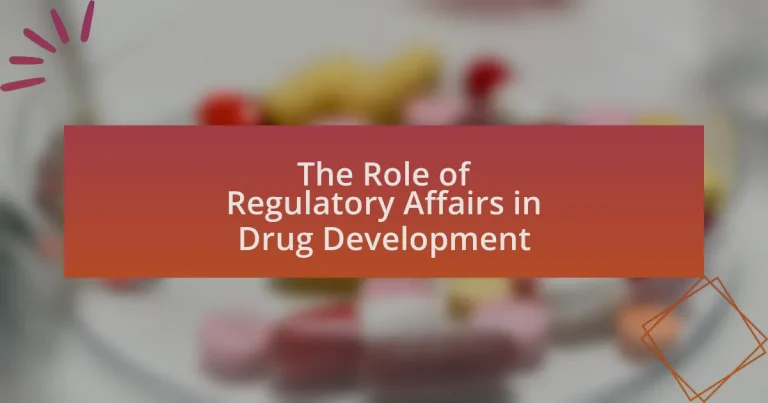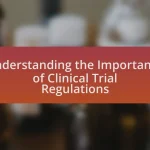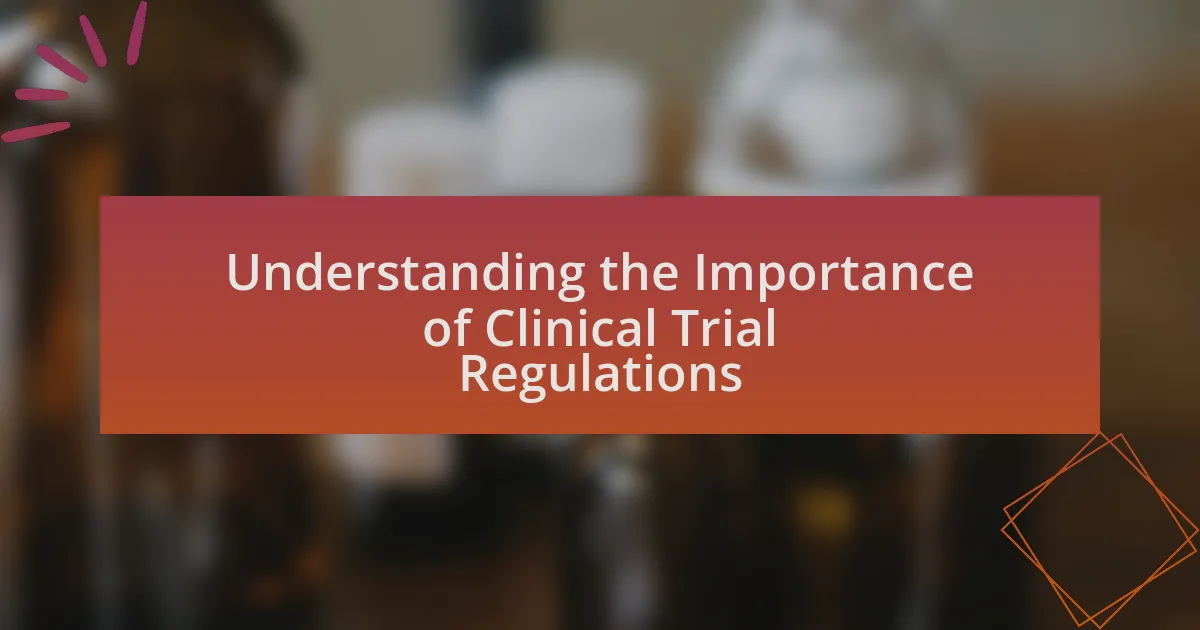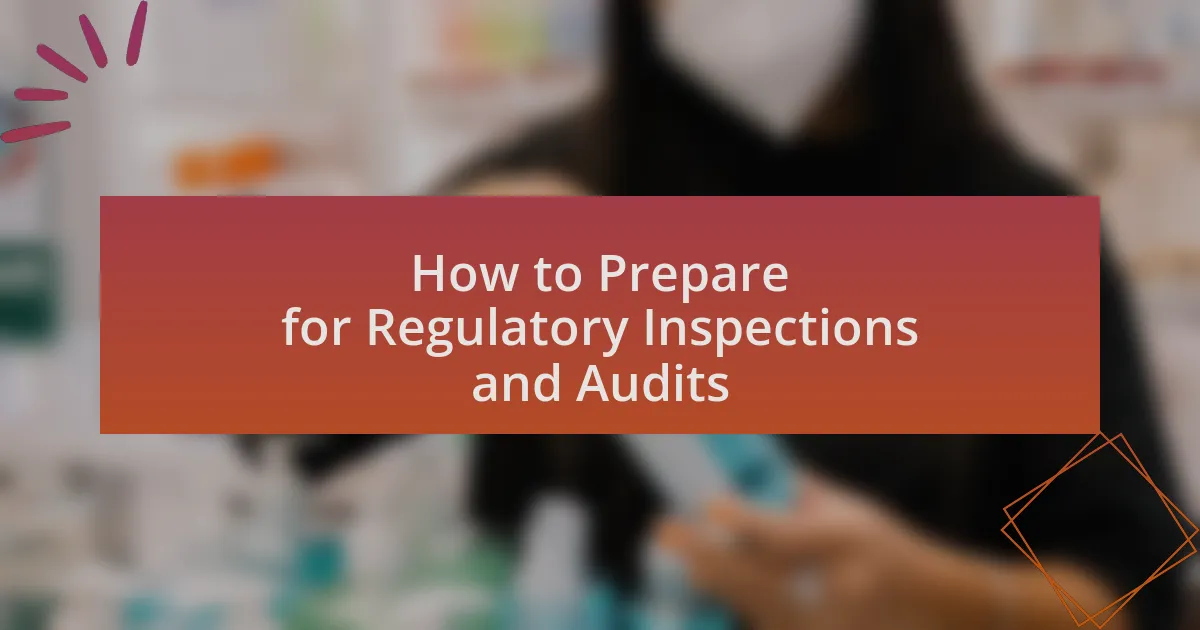The article focuses on the critical role of Regulatory Affairs in drug development, emphasizing its responsibility for ensuring compliance with regulations and standards set by governmental agencies. It outlines the key functions of Regulatory Affairs professionals, including the preparation and submission of necessary documentation for drug approval, monitoring regulatory changes, and facilitating communication between pharmaceutical companies and regulatory bodies. The article also discusses the impact of Regulatory Affairs on drug safety, efficacy, and market access, as well as the challenges faced in navigating complex regulatory frameworks. Additionally, it highlights best practices and strategies to enhance the effectiveness of Regulatory Affairs in the pharmaceutical industry.
What is the Role of Regulatory Affairs in Drug Development?
The role of regulatory affairs in drug development is to ensure that pharmaceutical products comply with all regulations and standards set by governmental agencies. Regulatory affairs professionals are responsible for preparing and submitting documentation required for drug approval, including clinical trial applications and marketing authorization submissions. They also monitor the regulatory landscape to ensure ongoing compliance throughout the product lifecycle, which includes post-market surveillance and reporting adverse events. This function is critical as it helps safeguard public health by ensuring that only safe and effective drugs reach the market, as evidenced by the rigorous approval processes mandated by agencies like the FDA and EMA.
How does Regulatory Affairs influence the drug development process?
Regulatory Affairs significantly influences the drug development process by ensuring compliance with legal and scientific standards throughout the lifecycle of a drug. This function involves the preparation and submission of regulatory documents to health authorities, which is critical for obtaining approvals for clinical trials and marketing. For instance, the U.S. Food and Drug Administration (FDA) requires comprehensive data on safety and efficacy before granting Investigational New Drug (IND) applications, directly impacting the timeline and strategy of drug development. Additionally, Regulatory Affairs professionals monitor changes in regulations and guidelines, which can lead to adjustments in development plans to meet evolving requirements, thereby minimizing risks and enhancing the likelihood of successful product approval.
What are the key responsibilities of Regulatory Affairs professionals?
Regulatory Affairs professionals are primarily responsible for ensuring that companies comply with all regulations and laws pertaining to their products, particularly in the pharmaceutical and biotechnology sectors. Their key responsibilities include preparing and submitting regulatory documents to health authorities, such as Investigational New Drug applications and New Drug Applications, to obtain approval for clinical trials and marketing. They also monitor and interpret regulatory changes and guidelines to ensure ongoing compliance, facilitate communication between the company and regulatory agencies, and provide strategic advice on regulatory issues throughout the product lifecycle. These responsibilities are critical for maintaining product safety and efficacy, as evidenced by the stringent requirements set forth by agencies like the FDA and EMA, which govern the approval process for new drugs.
How do Regulatory Affairs ensure compliance with regulations?
Regulatory Affairs ensure compliance with regulations by systematically reviewing and submitting documentation required by regulatory bodies. This process includes preparing and submitting applications for drug approval, ensuring that all data meets the standards set by agencies such as the FDA or EMA. Regulatory Affairs professionals also monitor ongoing compliance through post-market surveillance and reporting adverse events, which is mandated by regulations to ensure continued safety and efficacy of drugs. By adhering to these protocols, Regulatory Affairs help maintain the integrity of the drug development process and protect public health.
Why is Regulatory Affairs critical in the pharmaceutical industry?
Regulatory Affairs is critical in the pharmaceutical industry because it ensures that drugs are developed, manufactured, and marketed in compliance with legal and safety standards. This function protects public health by overseeing the approval processes for new medications, which involves rigorous evaluation of clinical trial data to confirm efficacy and safety. For instance, the U.S. Food and Drug Administration (FDA) requires extensive documentation and evidence before granting approval, which helps prevent unsafe or ineffective drugs from reaching the market. Additionally, Regulatory Affairs professionals facilitate communication between pharmaceutical companies and regulatory bodies, ensuring that all necessary guidelines are followed, thus maintaining the integrity of the drug development process.
What impact does Regulatory Affairs have on drug safety and efficacy?
Regulatory Affairs significantly impacts drug safety and efficacy by ensuring that pharmaceutical products meet established safety standards and demonstrate effectiveness before reaching the market. Regulatory Affairs professionals evaluate clinical trial data, oversee compliance with regulatory guidelines, and facilitate communication between drug developers and regulatory agencies. For instance, the U.S. Food and Drug Administration (FDA) requires rigorous testing and documentation to confirm that a drug is both safe for human use and effective for its intended purpose, which directly influences public health outcomes. This structured oversight helps prevent unsafe or ineffective drugs from being approved, thereby protecting patients and enhancing the overall quality of healthcare.
How does Regulatory Affairs contribute to market access for new drugs?
Regulatory Affairs plays a crucial role in facilitating market access for new drugs by ensuring compliance with regulatory requirements and guiding the drug approval process. This function involves preparing and submitting documentation to regulatory agencies, such as the FDA or EMA, which is essential for demonstrating the safety, efficacy, and quality of the drug. For instance, the submission of a New Drug Application (NDA) or Marketing Authorization Application (MAA) is a key step in obtaining market approval. Regulatory Affairs professionals also engage in strategic planning to navigate the regulatory landscape, including understanding guidelines and timelines, which can significantly impact the speed of market entry. By effectively managing these processes, Regulatory Affairs helps to minimize delays and optimize the chances of successful drug commercialization.
What are the stages of drug development where Regulatory Affairs is involved?
Regulatory Affairs is involved in several key stages of drug development, including preclinical research, clinical trials, and post-marketing surveillance. During preclinical research, Regulatory Affairs ensures compliance with guidelines for safety and efficacy before human trials begin. In clinical trials, they oversee the submission of Investigational New Drug applications and monitor adherence to regulatory requirements throughout the trial phases. After a drug is approved, Regulatory Affairs continues to play a role in post-marketing surveillance to ensure ongoing compliance and safety monitoring. These stages are critical for ensuring that drugs meet regulatory standards and are safe for public use.
How does Regulatory Affairs engage during preclinical research?
Regulatory Affairs engages during preclinical research by ensuring compliance with regulatory requirements and guiding the development process to meet safety and efficacy standards. This involvement includes the preparation and submission of Investigational New Drug (IND) applications, which require comprehensive data on pharmacology, toxicology, and manufacturing processes. Regulatory Affairs professionals also collaborate with research teams to design studies that align with regulatory expectations, thereby facilitating smoother transitions to clinical trials. Their expertise helps identify potential regulatory hurdles early in the research phase, ensuring that the data generated is suitable for future regulatory submissions.
What regulatory submissions are required before clinical trials?
Before clinical trials, regulatory submissions required include an Investigational New Drug (IND) application in the United States or a Clinical Trial Application (CTA) in Europe. The IND application must provide data on the drug’s safety, manufacturing, and proposed clinical study protocols, while the CTA must include similar information along with ethical considerations. These submissions are critical as they ensure that the proposed trials meet safety and efficacy standards set by regulatory authorities, thereby protecting participants and ensuring scientific integrity.
How do Regulatory Affairs professionals support preclinical studies?
Regulatory Affairs professionals support preclinical studies by ensuring compliance with regulatory requirements and facilitating communication between research teams and regulatory agencies. They play a critical role in the preparation and submission of Investigational New Drug (IND) applications, which are essential for obtaining approval to begin clinical trials. Additionally, they provide guidance on the design of preclinical studies to meet regulatory standards, ensuring that the studies generate data that is acceptable for regulatory review. Their expertise helps to identify potential regulatory hurdles early in the development process, thereby streamlining the path to clinical testing and reducing the risk of delays.
What role does Regulatory Affairs play in clinical trials?
Regulatory Affairs plays a critical role in clinical trials by ensuring compliance with legal and ethical standards throughout the research process. This function involves the preparation and submission of regulatory documents to health authorities, such as Investigational New Drug applications, which are essential for obtaining approval to initiate clinical trials. Regulatory Affairs professionals also monitor trial progress, ensuring adherence to Good Clinical Practice guidelines, and facilitate communication between sponsors and regulatory bodies. Their involvement is crucial for maintaining participant safety and data integrity, as evidenced by the requirement for regulatory oversight in clinical trial protocols, which is mandated by agencies like the FDA and EMA.
What are the regulatory requirements for clinical trial applications?
Regulatory requirements for clinical trial applications include the submission of a detailed protocol, informed consent documents, and relevant investigator qualifications to regulatory authorities. These documents must demonstrate the trial’s scientific validity, ethical considerations, and safety measures for participants. Additionally, compliance with Good Clinical Practice (GCP) guidelines is mandatory, ensuring that trials are conducted ethically and that data integrity is maintained. Regulatory bodies, such as the FDA in the United States and EMA in Europe, require these submissions to assess the trial’s potential risks and benefits before granting approval.
How do Regulatory Affairs ensure participant safety during trials?
Regulatory Affairs ensure participant safety during trials by implementing strict guidelines and oversight throughout the clinical trial process. They establish protocols that require comprehensive risk assessments, informed consent procedures, and continuous monitoring of participant health and safety. Regulatory Affairs professionals also ensure compliance with regulations set by authorities such as the FDA and EMA, which mandate that trials adhere to Good Clinical Practice (GCP) standards. These standards include regular audits and reporting of adverse events, ensuring that any safety concerns are promptly addressed.
How does Regulatory Affairs facilitate the approval process?
Regulatory Affairs facilitates the approval process by ensuring that drug development complies with all regulatory requirements set by health authorities. This includes preparing and submitting documentation, such as Investigational New Drug applications and New Drug Applications, which detail the safety and efficacy of the drug. Regulatory Affairs professionals also engage with regulatory agencies to clarify requirements and address any concerns, thereby streamlining communication and expediting the review process. Their expertise in regulatory guidelines and submission processes is critical, as evidenced by the fact that well-prepared submissions can significantly reduce review times, as seen in the FDA’s approval statistics where complete applications lead to faster decisions.
What documentation is necessary for drug approval submissions?
The documentation necessary for drug approval submissions includes a comprehensive set of materials such as the Investigational New Drug (IND) application, clinical trial data, manufacturing information, labeling, and a New Drug Application (NDA) or Biologics License Application (BLA). The IND application outlines the drug’s development plan and safety data from preclinical studies, while the clinical trial data provides evidence of the drug’s efficacy and safety from human studies. Manufacturing information details the production process and quality control measures, and labeling includes proposed usage instructions and safety information. The NDA or BLA compiles all this information for regulatory review, ensuring compliance with standards set by authorities like the FDA.
How do Regulatory Affairs professionals interact with regulatory agencies?
Regulatory Affairs professionals interact with regulatory agencies by submitting documentation, responding to inquiries, and participating in meetings to ensure compliance with regulations. They prepare and submit applications for drug approvals, such as Investigational New Drug (IND) applications and New Drug Applications (NDA), which require detailed data on safety and efficacy. Additionally, these professionals engage in ongoing communication with agencies like the FDA or EMA to address any questions or concerns that arise during the review process. This interaction is crucial for navigating the regulatory landscape and facilitating the timely approval of new drugs.
What are the challenges faced by Regulatory Affairs in drug development?
Regulatory Affairs in drug development faces several challenges, including navigating complex regulatory frameworks, ensuring compliance with evolving guidelines, and managing communication between stakeholders. The complexity arises from the need to understand and apply regulations from multiple jurisdictions, such as the FDA in the United States and EMA in Europe, which can differ significantly. Additionally, regulatory guidelines are frequently updated, requiring continuous education and adaptation by professionals in the field. Effective communication is crucial, as Regulatory Affairs must coordinate between pharmaceutical companies, regulatory bodies, and clinical research organizations to ensure that all parties are aligned and informed throughout the development process. These challenges can lead to delays in drug approval and increased costs, impacting the overall efficiency of bringing new therapies to market.
What common obstacles do Regulatory Affairs professionals encounter?
Regulatory Affairs professionals commonly encounter obstacles such as evolving regulatory requirements, which can lead to compliance challenges. These professionals must navigate complex and frequently changing regulations set by agencies like the FDA and EMA, making it difficult to ensure that products meet all necessary standards. Additionally, they face challenges related to communication and collaboration with cross-functional teams, as differing priorities and timelines can hinder the regulatory process. Furthermore, the increasing demand for expedited approvals can pressure professionals to balance speed with thoroughness, potentially compromising the quality of submissions. These obstacles are critical as they directly impact the efficiency and success of drug development processes.
How do changes in regulations affect drug development timelines?
Changes in regulations can significantly extend or shorten drug development timelines. For instance, the introduction of more stringent safety and efficacy requirements can lead to longer clinical trial phases, as companies must gather additional data to meet these new standards. Conversely, expedited pathways, such as the FDA’s Breakthrough Therapy designation, can accelerate the review process, allowing drugs to reach the market faster. Historical data shows that regulatory changes, such as the implementation of the 21st Century Cures Act in the U.S., have led to a reduction in average approval times for certain therapies, demonstrating the direct impact of regulatory frameworks on development timelines.
What strategies can be employed to overcome regulatory challenges?
To overcome regulatory challenges, organizations can employ strategies such as proactive engagement with regulatory authorities, thorough understanding of regulatory requirements, and implementation of robust compliance systems. Proactive engagement involves establishing open lines of communication with regulators to clarify expectations and address concerns early in the development process. A thorough understanding of regulatory requirements ensures that all aspects of drug development align with the latest guidelines, reducing the risk of non-compliance. Implementing robust compliance systems, including regular audits and training programs, helps organizations maintain adherence to regulations and quickly adapt to any changes. These strategies are supported by the fact that companies with strong regulatory affairs practices often experience fewer delays in drug approvals, as evidenced by studies showing that effective regulatory strategies can lead to a 30% reduction in time to market for new drugs.
How do global regulations impact Regulatory Affairs practices?
Global regulations significantly shape Regulatory Affairs practices by establishing standardized requirements for drug development and approval processes across different countries. These regulations ensure that pharmaceutical companies comply with safety, efficacy, and quality standards, which vary by region but often align with international guidelines such as those set by the International Council for Harmonisation (ICH). For instance, the ICH guidelines facilitate the harmonization of regulatory requirements, reducing duplication of efforts and streamlining the approval process for new drugs in multiple markets. Consequently, Regulatory Affairs professionals must stay informed about these global regulations to effectively navigate the complexities of drug development, ensuring compliance and expediting market access.
What are the differences in regulatory requirements across regions?
Regulatory requirements differ significantly across regions, impacting drug development processes. In the United States, the Food and Drug Administration (FDA) mandates rigorous clinical trials and extensive documentation for drug approval, emphasizing safety and efficacy. Conversely, the European Medicines Agency (EMA) follows a centralized procedure that allows for a single marketing authorization valid across EU member states, but it also requires compliance with the European Union’s stringent pharmacovigilance regulations. In Asia, countries like Japan have unique requirements, such as the need for local clinical trials even if data from other regions is available. These regional differences stem from varying healthcare priorities, legal frameworks, and cultural attitudes towards drug safety and innovation.
How can companies navigate international regulatory landscapes?
Companies can navigate international regulatory landscapes by establishing a comprehensive understanding of the specific regulations in each target market. This involves conducting thorough research on local laws, engaging with regulatory agencies, and employing experts in regulatory affairs who are familiar with the nuances of each jurisdiction. For instance, the International Council for Harmonisation of Technical Requirements for Pharmaceuticals for Human Use (ICH) provides guidelines that help streamline drug development processes across multiple regions, thereby facilitating compliance. Additionally, companies can utilize regulatory intelligence tools to stay updated on changes in regulations, which is crucial for maintaining compliance and ensuring successful market entry.
What best practices can enhance the effectiveness of Regulatory Affairs?
Implementing a robust regulatory strategy enhances the effectiveness of Regulatory Affairs. This includes maintaining clear communication with regulatory agencies, ensuring compliance with local and international regulations, and conducting thorough risk assessments throughout the drug development process. For instance, companies that engage early with regulatory bodies often experience smoother approval processes, as evidenced by the FDA’s guidance on early interactions, which can lead to a 30% reduction in time to market for new drugs. Additionally, investing in continuous training for regulatory professionals ensures they stay updated on evolving regulations, further improving compliance and efficiency.
How can effective communication improve Regulatory Affairs outcomes?
Effective communication can significantly improve Regulatory Affairs outcomes by ensuring clarity and alignment between stakeholders, which facilitates timely approvals and compliance. When regulatory professionals communicate effectively with internal teams and external regulatory bodies, they can convey critical information regarding product development, safety data, and compliance requirements more efficiently. This reduces misunderstandings and accelerates the review process, as evidenced by studies showing that organizations with strong communication practices experience up to 30% faster approval times for new drugs. Additionally, effective communication fosters collaboration, enabling teams to address regulatory challenges proactively, thereby enhancing overall project success rates in drug development.
What tools and technologies support Regulatory Affairs functions?
Regulatory Affairs functions are supported by various tools and technologies, including regulatory submission management software, document management systems, and compliance tracking tools. These technologies streamline the submission process, enhance collaboration among stakeholders, and ensure adherence to regulatory requirements. For instance, software like Veeva Vault and MasterControl facilitate efficient document management and regulatory submissions, while compliance tracking tools help organizations monitor and maintain compliance with evolving regulations. The integration of these tools improves the overall efficiency and effectiveness of Regulatory Affairs in drug development.
How can continuous education benefit Regulatory Affairs professionals?
Continuous education benefits Regulatory Affairs professionals by enhancing their knowledge of evolving regulations and industry standards. This ongoing learning enables professionals to stay current with changes in regulatory requirements, which is crucial for ensuring compliance in drug development. For instance, the FDA frequently updates guidelines, and professionals who engage in continuous education are better equipped to interpret and implement these changes effectively. Additionally, continuous education fosters skills in risk assessment and management, which are vital for navigating complex regulatory landscapes. By participating in workshops, seminars, and certification programs, Regulatory Affairs professionals can improve their expertise, ultimately leading to more efficient drug approval processes and better patient safety outcomes.
What are the key takeaways for successful Regulatory Affairs in drug development?
Successful Regulatory Affairs in drug development requires a thorough understanding of regulatory requirements, effective communication with regulatory bodies, and proactive risk management. Regulatory professionals must stay updated on evolving regulations and guidelines, such as those from the FDA and EMA, to ensure compliance throughout the drug development process. Additionally, fostering strong relationships with regulatory agencies can facilitate smoother approvals and address potential issues early. Implementing a robust quality management system is essential for maintaining data integrity and ensuring that all submissions are accurate and complete. These practices are supported by the fact that companies with strong regulatory strategies often experience faster time-to-market and reduced development costs, as evidenced by industry reports indicating that effective regulatory management can shorten approval timelines by up to 30%.
How can organizations foster a culture of compliance and collaboration?
Organizations can foster a culture of compliance and collaboration by implementing clear policies, providing regular training, and encouraging open communication. Establishing comprehensive compliance frameworks ensures that all employees understand regulatory requirements, while ongoing training sessions keep staff updated on best practices and changes in regulations. Furthermore, promoting a collaborative environment through team-building activities and cross-departmental projects enhances trust and communication, leading to a more cohesive approach to compliance. Research indicates that organizations with strong compliance cultures experience fewer regulatory violations and improved employee morale, which supports the effectiveness of these strategies.
What practical tips can improve the efficiency of Regulatory Affairs teams?
To improve the efficiency of Regulatory Affairs teams, implementing streamlined communication processes is essential. Effective communication reduces misunderstandings and accelerates decision-making, which is crucial in the fast-paced environment of drug development. Additionally, utilizing regulatory intelligence tools can enhance the team’s ability to stay updated on changing regulations, thereby minimizing compliance risks. Training team members on these tools and fostering a culture of continuous learning further boosts efficiency by ensuring that all members are equipped with the latest knowledge and skills. Data management systems that centralize documentation and automate workflows also contribute significantly to operational efficiency, as they reduce manual errors and save time in document retrieval and submission processes.





